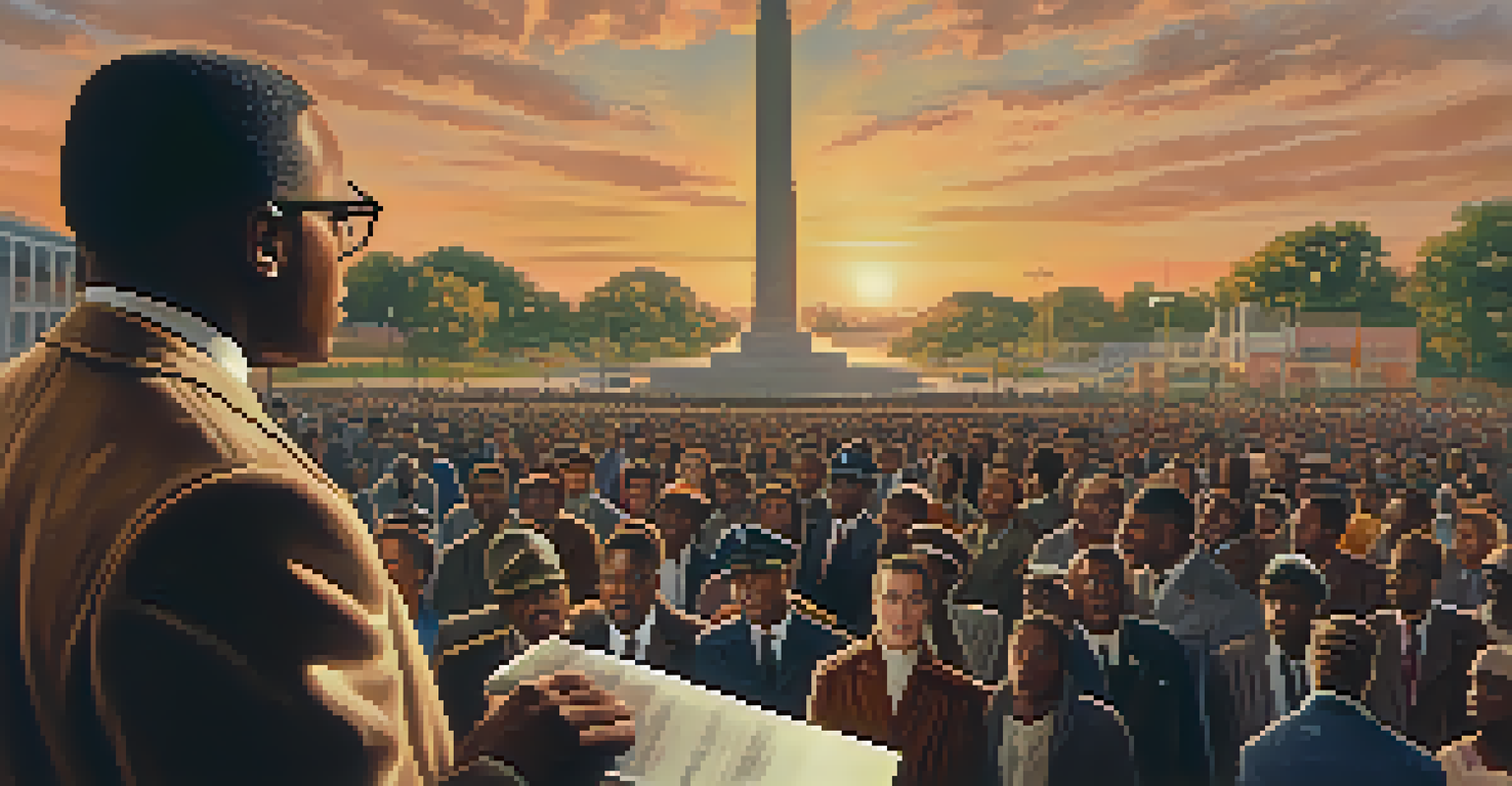Hollywood's Role in Shaping Global Political Narratives Today

The Power of Storytelling in Politics
Storytelling has always been a powerful tool in influencing public opinion. Through compelling narratives, Hollywood captures the hearts and minds of audiences, making complex issues more relatable. Films and series often simplify intricate political themes, allowing viewers to digest them easily and engage with them emotionally.
The stories we tell ourselves shape our lives and our world.
For instance, movies like 'The Pursuit of Happyness' highlight social issues like poverty and the American Dream, prompting discussions about inequality. By framing stories around these themes, Hollywood invites audiences to reflect on their own lives and the political structures surrounding them. This emotional connection can lead viewers to adopt new perspectives on important global issues.
Thus, the stories told in Hollywood not only entertain but also inform, pushing viewers to consider their role in the political landscape. The ability of film to evoke empathy is a powerful catalyst for change, inspiring audiences to act or think differently about the world around them.
Globalization of Hollywood Content
Hollywood movies have transcended borders, resonating with audiences worldwide. This globalization means that the political narratives presented in these films can influence perceptions across different cultures and societies. A single blockbuster can spark conversations about democracy, human rights, and global conflict in countries far removed from Hollywood's typical audience.

For example, films like 'Hotel Rwanda' and '12 Years a Slave' have brought attention to critical historical events and injustices, prompting viewers to reflect on their own societies. As these narratives spread, they foster a shared understanding of global issues, making them more accessible to people who may not have been aware of them otherwise. This interconnectedness highlights the role of Hollywood in shaping a global political consciousness.
Storytelling Shapes Political Views
Compelling narratives in Hollywood films help audiences engage emotionally with complex political issues.
As a result, international audiences often find themselves engaging with American political narratives, which can alter their views on their own local contexts. The power of cinema to bridge cultural gaps is profound, making Hollywood a significant player in the global political arena.
Celebrities as Political Influencers
In today's digital age, celebrities hold immense sway over public opinion, often using their platforms to advocate for political causes. Hollywood stars like Leonardo DiCaprio and Emma Watson have harnessed their fame to draw attention to issues like climate change and gender equality. Their involvement not only raises awareness but also encourages fans to engage with these topics more deeply.
Cinema is a matter of what's in the frame and what's out.
The influence of celebrities extends beyond traditional media; social media platforms amplify their messages, reaching millions instantly. This immediacy allows them to mobilize support quickly, whether it's for a charity, a protest, or a political campaign. The ability of these figures to connect with younger audiences can lead to a significant shift in political engagement, inspiring a new generation of activists.
However, the impact of celebrity activism is not without controversy. Critics argue that the focus on individual stars can overshadow the complexities of the issues they champion. Nevertheless, the ability of Hollywood figures to shape political narratives remains undeniable, as they often serve as the entry point for discussions on critical global topics.
Documentaries and Political Awareness
Documentaries have become a vital part of Hollywood's contribution to political discourse. Unlike fictional films, documentaries present real-life events and issues, providing audiences with factual information that can inspire action. Films like 'An Inconvenient Truth' and '13th' have sparked national conversations about climate change and racial injustice, respectively.
These films not only inform but also challenge viewers to confront uncomfortable truths, often leading to increased activism. The power of documentary filmmaking lies in its ability to humanize complex issues, making them relatable and urgent. By showcasing personal stories and real-world consequences, these films can motivate audiences to demand change.
Global Reach Influences Perspectives
Hollywood's globalization allows political narratives to resonate worldwide, fostering shared understanding of critical issues.
Additionally, the rise of streaming platforms has made documentaries more accessible than ever, allowing them to reach a broader audience. This democratization of information empowers viewers to educate themselves, fostering a more informed citizenry that can engage with political issues on a deeper level.
Biopics and Political Narratives
Biopics, or biographical films, often dramatize the lives of significant political figures, offering insights into their motivations and struggles. These films can shape public perception of historical events and characters, sometimes leading to a more nuanced understanding of their contributions. For instance, 'Selma' provides a portrayal of Martin Luther King Jr.'s efforts during the civil rights movement, highlighting the complexities of activism.
By humanizing these figures, biopics can inspire viewers to reflect on the values and principles that guide political movements. They often emphasize the sacrifices made by individuals in the pursuit of justice, encouraging audiences to engage with contemporary issues. In this way, Hollywood not only entertains but also educates, making history accessible and relevant.
However, the dramatization of real events can lead to controversies regarding accuracy and representation. While biopics have the power to inform, they also have the responsibility to portray figures and events truthfully, lest they reinforce stereotypes or misconceptions. Balancing storytelling with factual representation is crucial in maintaining the integrity of these narratives.
The Role of Humor in Political Commentary
Comedy has long been a staple of political commentary, with Hollywood comedians using humor to address serious issues. Shows like 'Saturday Night Live' and films such as 'The Dictator' provide satirical takes on political figures and events, making audiences laugh while simultaneously encouraging them to think critically. This blend of humor and critique can be a powerful tool for political engagement.
Through satire, comedians can highlight the absurdity of certain political situations, prompting viewers to reconsider their perspectives. The ability to laugh at serious issues can make them feel less daunting, opening the door for discussions that might otherwise be uncomfortable. By using humor, Hollywood can address heavy topics in a more approachable way.
Celebrities Drive Political Engagement
Celebrities leverage their platforms to advocate for social causes, significantly influencing public opinion and activism.
However, the effectiveness of political humor can vary widely among audiences. What one person finds hilarious, another might find offensive or trivializing. This highlights the challenge Hollywood faces in using comedy as a vehicle for political discourse while ensuring inclusivity and sensitivity to diverse viewpoints.
Future Trends: Hollywood and Global Politics
As the world evolves, so too does Hollywood's role in shaping political narratives. The rise of streaming services and global content distribution is changing how stories are told and who gets to tell them. This shift presents an opportunity for diverse voices and perspectives to emerge, enriching the political discourse presented through film and television.
Moreover, as global issues such as climate change, migration, and inequality become increasingly urgent, Hollywood is likely to respond with stories that reflect these challenges. Filmmakers may increasingly draw from real-world events to create narratives that resonate with audiences worldwide, fostering a deeper understanding of interconnected global issues.

Ultimately, Hollywood's influence on political narratives will continue to evolve, shaped by technological advancements and shifting audience expectations. As filmmakers embrace their role as storytellers and educators, they will play a crucial part in fostering a more informed and engaged global community.